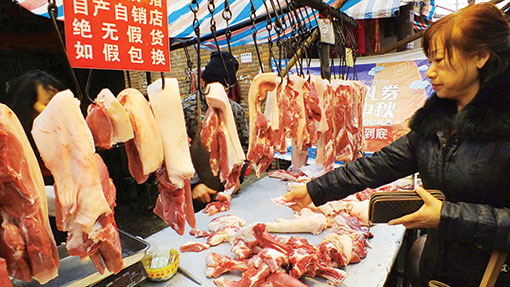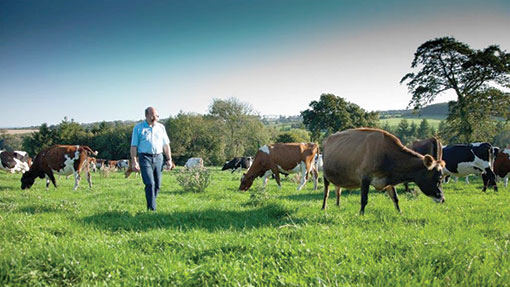How to get your farm products into China

What does this huge market offer for UK food exports? Charlie Taverner looks at the prospects and catches up with those who are already reaping the rewards
The dragon is roaring – and politicians and businessmen are getting excited.
In December, David Cameron led a trade mission to China, squeezing 120 industry leaders on to a specially chartered Boeing 747 in the hope of kick-starting exports to the People’s Republic.
British food and farming were represented by DEFRA secretary Owen Paterson, Dairy Crest chief executive officer Mark Allen and Devon sausage-maker Charles Baughan.
China’s numbers set export-minded food producers salivating. It has a population of 1.36 billion – just under a fifth of the world total – and its GDP grew 7.7% last year.
All those people need feeding. Last year the Chinese spent US$768bn (£464bn) on food, about five times more than the UK, and it could grow to US$815bn (£491bn) in 2014, according to analyst Euromonitor.
Demand is so high that in some sectors the Chinese cannot produce enough at home.
China has been a net importer of pork, its favourite meat, since 2008 and now brings in more than 400,000t/year.
It is one of the world’s largest dairy importers, buying 535,000t of whole milk powder last year.
The country’s growing middle class is developing western tastes and can afford more expensive foreign imports. Scottish whisky and smoked salmon are increasingly popular and other agricultural products could follow.
But taking advantage of this booming market is not simple.
The UK has traded quite freely with Hong Kong for years but on China’s mainland, tight import rules mean only certain products from approved sites are allowed in.
UK beef and lamb cannot be exported to mainland China and DEFRA is working on opening up the poultrymeat trade. For now, pork and dairy are leading the way.
Nation has love affair with pork
China loves pork: the average Chinese person eats 38kg a year and last year it accounted for about three quarters of their meat consumption.
Despite being home to half the world’s pigs, China is looking abroad for high-quality pork to meet its needs.
Currently the UK can export live pigs, fresh and frozen cuts, and a limited number of offals, but negotiations for trotters, stomachs and processed pork, such as sausages, are ongoing.
BPEX director Mick Sloyan said the opportunities for British producers were huge.
“There is an insatiable and growing demand for pigmeat,” he said. “As China modernises, putting more people into cities, earning a lot more money, they want to consume pork.
“We are shipping everything else from snouts to tails and pretty much everything between.”
In the first half of 2013, UK pork exports to China were worth £9.53m, 591% up on the same period in 2012. Much of that is in fifth-quarter products that are popular in China but not in the UK.
Cranswick Country Foods has had the necessary health certificates for 18 months and ships about 30 containers a week to China and Hong Kong. Its main exports are heads, forehocks, neck bones, riblets, feet and offals, but it hopes to add belly, loin, shoulder and leg meat soon.
The meat is frozen for transport and takes about 35 days to reach the main Chinese ports.
“If you work on the shipping costs it is about 10p/kg,” said Cranswick export manager Edward Wright. “Compared to the price for bones in the UK there can be anything up to 40p/kg benefit for exporting to China.
“We need the China market to help sustain a pig price that works for the producer and processor.”
Charles Baughan, managing director of Devon’s Westaway Sausages, is still waiting to export his products into mainland China.
He an experienced exporter and already sells to Hong Kong, Singapore and Japan. After a chance meeting with the prime minister at the North Devon Show in August, he went on the trade mission to try to speed up negotiations on processed pork.
One result was that the UK government is recruiting a representative to work in Beijing, part-funded by BPEX, to ensure licences and applications are drawn up quickly.
“It is still very much a work in progress and I need to see certain things in writing before we are able to attack this market,” Mr Baughan said. “I hope that is in a matter of months rather than years.”
There are no general export licences for trading meat with China. This means that once both governments agree on food safety protocols and health certificates, every exporting abattoir must be approved and every shipment must carry the right documents.
“In life you can produce commodities or brands,” he said. “Our brand is provenance. That is very appealing to a foreign market.”
Dairy can thrive on milk demand
The UK dairy sector is also looking east. Many Chinese still distrust their domestic supply after the 2008 melamine scandal, when thousands of babies were hospitalised after drinking contaminated baby formula, and the country’s demand for whole and skim milk powder is a significant driver of world prices.
Dairy Crest CEO Mark Allen used the trade mission to make industry contacts who could help the company prepare to enter the Chinese baby formula market and launch its cheese brands such as Cathedral City.
In October, Dairy Crest announced a £45m investment at its Davidstow factory to produce demineralised whey powder, the base ingredient for baby food.
“Exposure to the Chinese market will allow further sales of British dairy brands,” Mr Allen said. “This will generate further demand for British milk, benefiting the domestic processing businesses.
“British exporters are well regarded in China and recognised for producing consistently high-quality, safe and nutritious products.”
Smaller dairy businesses are also heavily involved. Welsh dairy Trioni and Somerset cheese exporter Somerdale International are tapping into the opportunities.
Somerdale exports more than 250 British cheeses to more than 50 countries and for the past two years has been developing business in China. It shipped close to 50t last year and hopes to exceed 250t this year, packing 14t of cheese a time into 40ft containers.
Managing director Stephen Jones said it had taken a long time to carry out the necessary testing and paperwork, but having an English contact in Beijing who spoke the language had saved a lot of time.
“Like every market, you have got to keep going out there – it is a lot about relationships. They like to go out with you and meet you.”
“There are people with disposable income who want Western products. The older generation don’t eat cheese but the younger generation are starting to.
“The other big thing is safety. Any imported things are perceived to be safer.”
- China has a population of 1.36 billion – just under a fifth of the world total
- Last year the Chinese spent US$768bn (£464bn) on food, about five times more than the UK, and this could grow by £27bn in 2014
- China imports about 400,000t of pork a year and imported 535,000t of whole milk powder in 2013
- The average Chinese person eats 38kg of pork a year
- In the first half of 2013, UK pork exports to China were worth £9.53m, 591% up on the same period in 2012
- Stephen Jones, Somerdale International: “Like every market, you have got to keep going out there – it is a lot about relationships.”
- Mick Sloyan, BPEX: “You have got to be inscrutable and have some patience. It can be frustrating.”
- Claire Urry, China-Britain Business Council: “Attention to detail on paperwork is critical. Companies need to do thorough research so they understand what they are getting into.”
- Mark Allen, Dairy Crest: “As with any branded product, consumer knowledge is key and exporters may need to adapt their product portfolio to meet the requirements of individual export markets.”
- Charles Baughan, Westaway Sausages: “I think China is not the most simple of markets. If you are looking to export, first try something a little lower risk, maybe the EU.”
Organic milk travels well

Laurence Harris on his 2,000-acre dairy farm.
Laurence and Eira Harris run organic milk supplier Trioni from their 2,000-acre dairy farm in Pembrokeshire.
They received their first order to ship branded organic UHT milk to China in December 2012, having previously exported to the Middle East, Australia and Hong Kong.
Since then, they have sent five 20,000-litre containers of milk, totalling about £150,000 of business.
Trioni is the only China-certified organic dairy in the UK and had to pay for two inspectors to come from Beijing to check its farms and the factories it contracts to pack the milk.
“[The Chinese] are absolutely paranoid about contamination. It is extremely difficult to get it in and I understand why,” Mr Harris said.
He said building up relationships with Chinese contacts at international trade shows was key.
Mr Harris said UHT milk did not need refrigerating while it was shipped, but placement on the vessel was important.
“It can cook on top of these container ships over the Equator, so we have to make sure it is not on the top.”
Market is hard to break into
The China-Britain Business Council works with UK Trade & Industry to advise companies on getting started, providing on-ground support from its 13 Chinese offices.
CBBC executive director Claire Urry said there was plenty of opportunity for British agriculture, as well as related industries such as genetics and farming technology, as long as protocol was followed.
“Attention to detail on paperwork is critical,” she said. “Companies need to do thorough research so they understand what they are getting into.
“The key is getting a very good partner and distributor who has good links with customers.”
Alongside graft, patience is the other essential virtue for doing business in the Far East, according to Mick Sloyan at BPEX.
“As someone out there once told me: ‘You may perceive time in a certain way but as the world’s oldest civilisation we have a very different perception of what is a hurry and what is not,” he said.
“You need patience.”
